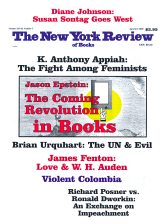To the Editors:
We have observed with great concern that Jörg Haider’s party has joined the Austrian government. It is a party that repeatedly has used (also during the last election campaign) a rhetoric hostile to foreigners and open to racist interpretation. Thus it awakens memories of the not so distant past: the rule of National Socialism and its atrocities. We feel that such rhetoric demands in Austria or Germany an even greater degree of vigilance than in other countries. We understand the concern of many, both within Austria and abroad, that a party which regularly employs such language can become a danger to the democratic order and to social peace.
We find it understandable, for these reasons, that the fourteen member-states of the European Union have issued declarations in which they emphasize their opposition to hostility to foreigners and to racism, and draw attention to the dangers of participation of the Freiheitliche Partei Österreichs in the Austrian government. However, we are concerned, at the same time, about the sanctions imposed upon Austria. We fear that the isolation of Austria resulting from those sanctions will weaken precisely those forces in Austrian politics and society which are in a position to counter the possible dangers.
Today, Austria is a stable and democratic country, entirely belonging to the European family. Undeniably, Austria has a legacy of racism and persecution of those who think differently. But it has also developed a tradition of tolerance and openness. Some of the undersigned remember Nazi rule, under which they have suffered or which drove them to emigration. Others recall having found refuge in Austria in their time of need.
This country deserves trust and dialogue—not exclusion from the European family. Austria’s democratically minded majority and its strong democratic institutions give us confidence that this country is able to deal with its problems.
Luc Bondy, Theater Director, Director of the Vienna Festival 2000
Rudolf Burger, Professor of Philosophy, Hochschule für angewandte Kunst, Vienna
Alfred Ebenbauer, Professor of German Language and Literature, University of Vienna
Wolfgang G. Fischer, President of the Austrian PEN Club
Hans Hollein, Architect
Wilhelm Holzbauer, Architect
Robert Me-nasse, Writer
Krzysztof Michalski, Director of the Institute of Human Sciences, Vienna, and Professor of Philosophy, Boston University
Peter Mitterbauer, President of the Federation of Austrian Industry
Fritz Molden, Author and Publisher
Fritz Mullar, Actor
Ariel Muzicant, President of the Jewish Community in Austria
Günther Nenning, Author
Helga No-wotny, Professor of Philosophy of Science
Eidgenössische Technische Hochschule, Zurich
Gustav Peichl, Architect
Arnulf Rainer, Artist
John Sailor, Director Gallery Olysses, Vienna
Karl Schwarzenberg
Lord Weidenfeld, Publisher,London
Erika Weinzierl, Professor Emeritus of Contemporary History, University of Vienna
Simon Wiesenthal, Director, Documentation Center of the Association of Jewish Victims of the Nazi Regime, Vienna
Georg Winckler, Rector of the University of Vienna and President of the Austrian Rectors’ Conference
This Issue
April 27, 2000



